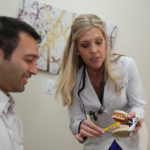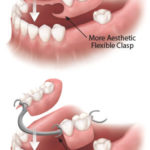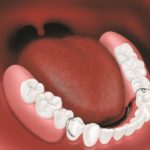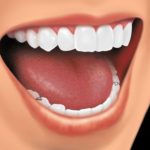Dentures are fully gum tissue supported removable appliances that always have some movement, trap food by nature and require a patient who is fully committed to having a removable denture option for whatever the reason. They are not easy to adapt to but given the right attitude and perseverance, many patients do very well. Upper dentures cover the roof of the mouth (palate) and will effect speech and taste of foods. Lower dentures without implants are ill advised and uncomfortable. In the very least, we recommend two lower implants for minimum comfort with lower dentures.
We recommend two lower implants for minimum comfort with lower dentures.
Partials are tooth borne removable appliances, which means the support is provided by the hard structure of the neighboring teeth. They are much more comfortable than dentures but still move, trap food, and affect speech and taste. There are several different options for partial frameworks. Resin or plastic based frameworks are the cheapest, the weakest, and are very difficult to adapt to new fillings or crowns. We consider these as temporary options because their fit is far inferior than the metal based partials. The metal frameworks are custom made and very precise. Teeth are prepared with grooves and divots to best fit these partials and the comfort is superior. However, they are still very difficult to adapt to changing fillings or crowns and in most cases will need to be replaced if major work is required. Even after a large filling, a partial will never fit the same again. Sometimes it is a minor change but always just a little different after.
An implant denture is the only option for lower dentures that we recommend. Lower implant dentures can be fixed hybrids that sit on 4-6 implants and are not removable by the patient. They are professionally removed once or twice per year for cleaning and screws need to be replaced. In the very least (and as I stated above), we recommend two-implant lower denture where the denture snaps on to the implants using a ball clasp system and this helps to fixate it in place. The tongue is a very strong muscle and makes it very difficult to have a lower denture without holding it in place with implants.
Patients can comfortably wear upper dentures and it is not as imperative to place implants on the upper arch. Without implants, the palate is covered and this will affect speech and taste. In order to uncover the palate, implant retained upper dentures are recommended. There is also the option of a fixed upper denture but most patients do excellent with a removable upper appliance that is easier to clean and care for than a fixed unit.









